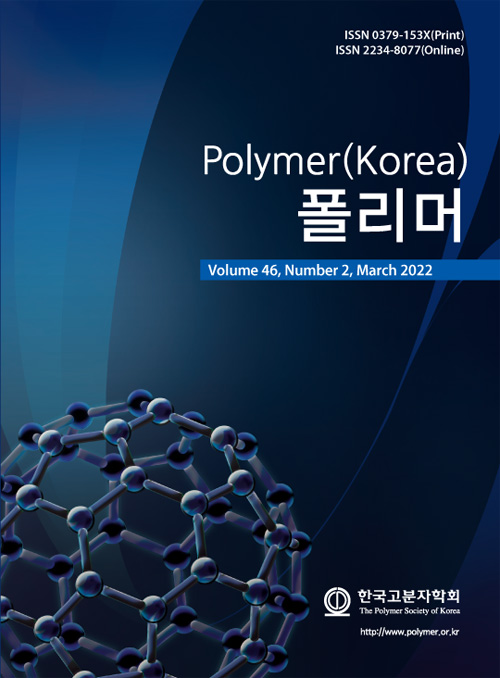- Study on Properties of Styrene-Butadiene Rubber Composites with Tanning-Treated Leather Waste
Yeongwoo Kim*, Hee Ro Kim*, **, Encheol Shin*, and Won-Ki Lee**,†

*Korea Institute of Footwear & Leather Technology, Busan 47154, Korea
**Department of Polymer Engineering, Pukyong National University, Busan 48547, Korea- 탄닝 처리된 가죽폐기물과 Styrene-Butadiene Rubber 복합소재 물성연구
*한국신발피혁연구원, **부경대학교 고분자공학과
Reproduction, stored in a retrieval system, or transmitted in any form of any part of this publication is permitted only by written permission from the Polymer Society of Korea.
The removed shaving scraps, mainly collagen fibers, after the tanning process in the leather manufacturing process cause environmental pollution and economic loss. To reduce the waste, styrene-butadiene rubber (SBR) composites with shaving scraps treated by different tanning agents, were prepared and characterized. The results showed that the mechanical properties of SBR composites significantly increased except softness, regardless of the type of tanning agent. Among tanning agents, the SBR/scrap composite treated by aluminum tanning agent was the best property. Additionally the mechanical properties of all composites increased up to 5 wt% of tanning agent. However, there was little improvement in the property when the tanning agent exceeded 5%. These results indicated SBR composites with 5 wt% of tanning agent could be applied in flooring materials or building interior materials.
콜라겐 섬유로 이루어진 shaving scrap은 가죽 제조 공정 중 발생하는 가죽 폐기물로 처리에 따른 환경오염 및 경제적 손실이 발생할 수 있어 이를 해결하기 위한 방안으로 styrene-butadiene rubber(SBR)을 바인더로 사용하여 collagen fiber–SBR 복합소재를 제조하여 특성을 분석하였다. 본 연구에서는 shaving scrap을 tanning agent를 처리하여 SBR 복합소재를 제조하여 특성을 확인하였다. Aluminium tanning agent를 적용한 SBR 복합재료의 특성이 가장 우수하였으며, tanning agent의 종류에 관계없이 5 wt%까지는 함량증가와 더불어 SBR 복합소재의 기계적 물성이 향상되는 결과를 보였다. 이러한 결과들로부터 SBR 복합재료의 물성 및 강도의 향상은 바닥재 등의 건축 내장재로 적용 가능할 것으로 보인다.
Keywords: shaving scrap, tanning agent, styrene-butadiene rubber composites, flooring materials.
- Polymer(Korea) 폴리머
- Frequency : Bimonthly(odd)
ISSN 0379-153X(Print)
ISSN 2234-8077(Online)
Abbr. Polym. Korea - 2023 Impact Factor : 0.4
- Indexed in SCIE
 This Article
This Article
-
2022; 46(2): 165-170
Published online Mar 25, 2022
- 10.7317/pk.2022.46.2.165
- Received on Oct 18, 2021
- Revised on Nov 29, 2021
- Accepted on Dec 1, 2021
 Correspondence to
Correspondence to
- Won-Ki Lee
-
Department of Polymer Engineering, Pukyong National University, Busan 48547, Korea
- E-mail: wonki@pknu.ac.kr








 Copyright(c) The Polymer Society of Korea. All right reserved.
Copyright(c) The Polymer Society of Korea. All right reserved.